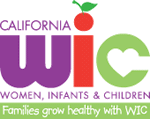 The Special Supplemental Nutrition Program for Women, Infants and
Children (WIC) serves pregnant, breastfeeding, and postpartum women,
infants and children under the age of five who are low to moderate income (up to
185% of the federal poverty level) and at nutrition risk. WIC is a short-term
intervention program designed to influence lifetime nutrition and health
behaviors in a targeted, high-risk population. The Special Supplemental Nutrition Program for Women, Infants and
Children (WIC) serves pregnant, breastfeeding, and postpartum women,
infants and children under the age of five who are low to moderate income (up to
185% of the federal poverty level) and at nutrition risk. WIC is a short-term
intervention program designed to influence lifetime nutrition and health
behaviors in a targeted, high-risk population.
WIC has a Mission. WIC gives our most vulnerable population the
best possible start by providing nutrition education and healthy foods during
critical stages of development so children achieve optimal nutritional status.
WIC is the Premier Prevention Program. The purpose of the WIC
Program is to prevent anemia, poor birth outcomes, such as infant mortality and
low birth weight, childhood obesity and to improve the nutrition and health of
participants. WIC is a cost-effective public health program.
WIC Core Services include client-centered individual and group
education, breastfeeding promotion and education, monthly food checks and
referrals to community services.
WIC is a Nutrition Program. WIC participants receive
prescriptive supplemental foods along with nutrition education, breastfeeding
support and referrals to attain life-long benefits of good nutrition and healthy
lifestyles.
WIC Provides Healthy Foods to supplement the dietary needs of
participants to ensure good health, growth and development. The foods have been
specifically chosen to provide consistency with the Dietary Guidelines for
Americans. The selected foods also reinforce WIC nutrition education messages,
address emerging public health nutrition- related issues including childhood
obesity and provide wide appeal to the diverse WIC population.
WIC Enthusiastically Supports Breastfeeding as the ideal method
of feeding and nurturing infants. Breastfeeding helps mothers feel close to
their babies and breast milk contains the nutrients that infants need to grow
and develop. Breastfed infants tend to be healthier since they receive
antibodies from the breast milk which protect them against infection. It has
been estimated that a minimum of $3.6 billion would be saved in medical care
costs if current US exclusive breastfeeding rates increased to at least 50% at 6
months. WIC provides extra food to mothers who exclusively breastfeed their
infants.
WIC is a Federally Funded Program. WIC is administered by the
United States Department of Agriculture (USDA).
WIC is National and Local. Nationwide, WIC serves over 9.2
million low to moderate income, nutritionally at-risk participants. In
California, the nation’s largest WIC Program, 83 local agencies serve about 1.5
million participants at 650 local sites.
The WIC Caseload Reflects California Diversity. The majority of
participants are Latino (78%), Caucasian (8%), African-American (5.5%), Asian
(5%), and Native American (<1%).
WIC is Culturally Competent and Family-Centered. WIC providers
are well-trained, experienced, culturally competent nutrition educators who are
skilled at working with young families, local communities and special
populations. Most WIC staff come from the community and speak the language(s) of
the community; many are current or former WIC participants.
WIC has a Presence in the Community. WIC Centers are located in
neighborhoods, often along public transportation lines and are an important
community asset.
WIC is User Friendly. WIC participants trust and feel safe with
WIC providers, who operate in an atmosphere of encouragement and empowerment
with minimal paperwork.
|